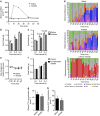The short-chain fatty acid acetate reduces appetite via a central homeostatic mechanism
- PMID: 24781306
- PMCID: PMC4015327
- DOI: 10.1038/ncomms4611
The short-chain fatty acid acetate reduces appetite via a central homeostatic mechanism
Abstract
Increased intake of dietary carbohydrate that is fermented in the colon by the microbiota has been reported to decrease body weight, although the mechanism remains unclear. Here we use in vivo(11)C-acetate and PET-CT scanning to show that colonic acetate crosses the blood-brain barrier and is taken up by the brain. Intraperitoneal acetate results in appetite suppression and hypothalamic neuronal activation patterning. We also show that acetate administration is associated with activation of acetyl-CoA carboxylase and changes in the expression profiles of regulatory neuropeptides that favour appetite suppression. Furthermore, we demonstrate through (13)C high-resolution magic-angle-spinning that (13)C acetate from fermentation of (13)C-labelled carbohydrate in the colon increases hypothalamic (13)C acetate above baseline levels. Hypothalamic (13)C acetate regionally increases the (13)C labelling of the glutamate-glutamine and GABA neuroglial cycles, with hypothalamic (13)C lactate reaching higher levels than the 'remaining brain'. These observations suggest that acetate has a direct role in central appetite regulation.
Figures





References
-
- Swinburn B. A. et al. The global obesity pandemic: shaped by global drivers and local environments. Lancet 378, 804–814 (2011). - PubMed
-
- Prentice A. M. & Jebb S. A. Fast foods, energy density and obesity: a possible mechanistic link. Obes. Rev. 4, 187–194 (2003). - PubMed
-
- Eaton S. B. The ancestral human diet: what was it and should it be a paradigm for contemporary nutrition? Proc. Nutr. Soc. 65, 1–6 (2006). - PubMed
-
- Sleeth M. L., Thompson E. L., Ford H. E., Zac-Varghese S. E. & Frost G. Free fatty acid receptor 2 and nutrient sensing: a proposed role for fibre, fermentable carbohydrates and short-chain fatty acids in appetite regulation. Nutr. Res. Rev. 23, 135–145 (2010). - PubMed
Publication types
MeSH terms
Substances
Grants and funding
LinkOut - more resources
Full Text Sources
Other Literature Sources
Medical

